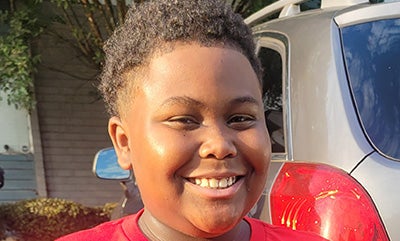Sickle cell disease
Sean Baker is an active middle school student who can already list a number of impressive achievements in his scholastic journey. A straight-A student, Sean is a member of the National Honor Society and the Beta Club at Phillips Academy in Birmingham. He serves on the student council and enjoys the mental challenge of the chess club. He plays trumpet in the school band and recently joined the golf team. Outside of school, Sean serves as an usher in his church and sings in the choir.
What may be surprising is that this active young man also has sickle cell disease, a blood disease that can be quite debilitating. In a person with sickle cell disease, the red blood cells are abnormal in shape and consistency, so they do not travel through the bloodstream as smoothly as they should. Instead, they can clog small blood vessels, which can cause periodic severe pain and serious health complications, including stroke. Sickle cell disease is hereditary.
As with many sickle cell patients, Sean was diagnosed with the disease at birth, thanks to state-mandated newborn testing. While his parents, Shenita and Carlos, knew their baby possibly would have sickle cell disease because they both carried the genetic trait, their familiarity with the disease was limited. They quickly learned as much as they could about the disease and the challenges their son might face. “Without our primary care physician and the Hematology Clinic at Children’s of Alabama, we would have been completely lost,” Shenita said.
Sean has been hospitalized a few times as a result of sickle cell disease. Treatment, which has included blood transfusions, has been successful. Otherwise, he and his parents have managed the disease in less aggressive ways, such as daily medication and regular clinic visits with Children’s hematologist Dr. Lee Hilliard, who has a special professional interest in sickle cell disease. “Sean hasn’t needed a lot of treatment,” Shenita said. “His pain crises have lessened, and the new medicines that have been developed since he was a baby have helped.”
Still, a pain crisis can occur in unpredictable fashion, and Sean’s parents have made sure he knows how to handle them. “We’ve tried to be proactive with him because we won’t always be with him when a crisis is triggered,” Shenita said. “He knows what medications he takes, how to take them, the importance of staying hydrated. He is aware that weather changes, especially cold weather, can trigger a pain crisis, so he knows to carry his weighted blanket to maintain his body temperature anytime he spends the night away from home.”
Apart from those practical measures, Sean has another important technique for handling a pain crisis. “I keep a song in my heart,” he said. “Singing acts as a distraction to help relax me and make me feel good inside.”
Sean is fortunate that his disease has not limited his ability to excel academically and participate in activities that provide an opportunity to give back to the community. He has inspired his family to join him in the annual Sickle Cell Walk and has won awards for his fundraising efforts. “He’s a sweetheart,” his mom said. “Everyone falls in love with him. He really has a servant’s heart.”






